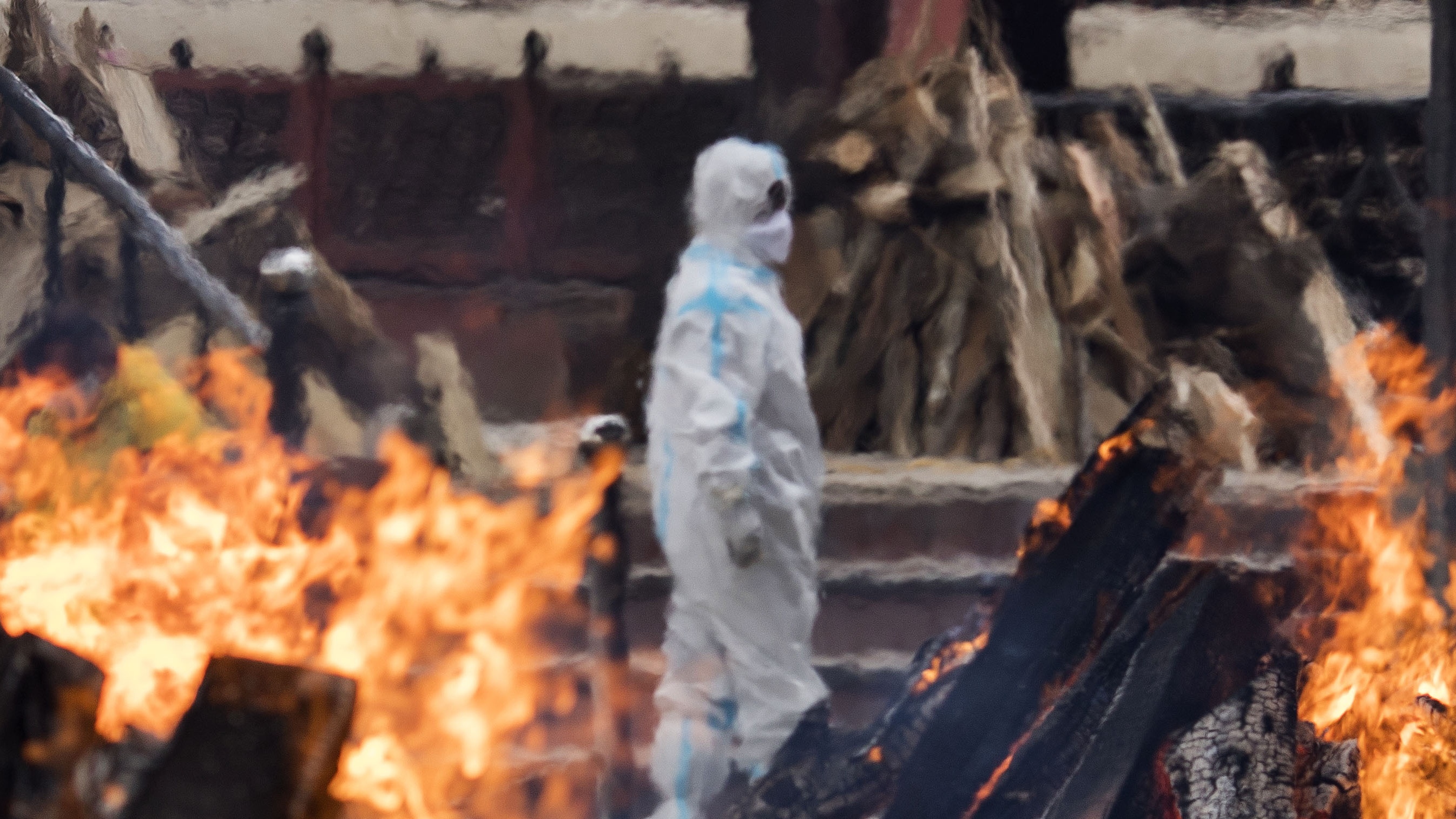Indian government accused of hiding true death toll of Covid ‘storm’
Witnesses claim many coronavirus fatalities are not being recorded as double mutation triggers healthcare crisis

A free daily email with the biggest news stories of the day – and the best features from TheWeek.com
You are now subscribed
Your newsletter sign-up was successful
The Indian government is massively underreporting the scale of the country’s Covid crisis, experts are claiming.
India recorded 349,691 new cases yesterday - setting a new global record for the fifth consecutive day - and 2,767 coronavirus deaths. But medical workers say those totals, “however staggering”, represent just “a fraction of the real reach of the virus’s spread, which has thrown the country into emergency mode”, The New York Times (NYT) reports.
The steep surge has been linked to a new “double mutant” Covid strain that has triggered a nationwide panic, “with hospitals unbearably full, oxygen supplies running low and desperate people dying in line waiting to see doctors”, the paper adds.
The Week
Escape your echo chamber. Get the facts behind the news, plus analysis from multiple perspectives.

Sign up for The Week's Free Newsletters
From our morning news briefing to a weekly Good News Newsletter, get the best of The Week delivered directly to your inbox.
From our morning news briefing to a weekly Good News Newsletter, get the best of The Week delivered directly to your inbox.
‘Covid apocalypse’
In a radio address yesterday, Prime Minister Narendra Modi urged all citizens to get vaccinated and exercise caution. “Our spirits were high after successfully dealing with the first wave,” he said. “But this storm has shaken the nation.”
The speech marked a significant shift in tone for Modi, who only the day before “could not hide his delight” as he greeted thousands of supporters at an an election rally in West Bengal, The Times reports. “I’ve never seen such huge crowds,” the PM said.
Modi had been riding high on a wave of praise after recorded new Covid cases in India dropped to an average of just 11,000 a day in February. Health Minister Harsh Vardhan declared last month that the country was “in the endgame” of the pandemic and described Modi as an “example to the world”.
A free daily email with the biggest news stories of the day – and the best features from TheWeek.com
Fuelled by “a cocktail of hubris, complacency and nationalist politics”, Modi “was determined to open up an economy that had taken a battering” during the pandemic, the newspaper continues. But the result has been a “Covid apocalypse” that is being “exacerbated by a slow domestic vaccine rollout, an ill-equipped health system, lax protection, pandemic fatigue and promotion of the economy over containment”, as well as the new double mutant variant of the virus.
The rapid collapse of India’s healthcare system “came as no surprise” to Abdul Fathahudeen, a critical care expert based in Kerela, who told The Times that he had warned “in February that Covid had not gone anywhere and a tsunami would hit us if urgent actions were not taken”.
“A false sense of normalcy crept in and everybody, including people and officials, did not take measures to stop the second wave,” he said. “Sadly, a tsunami has indeed hit us now.”
The “unprecedented surge” in deaths has seen families of victims “forced to store their dead at home as crematoriums are overwhelmed and hospitals struggle to function”, The Telegraph reports.
The paper’s India correspondent, Joe Wallen, tweets that he is being inundated with calls from acquaintances and people previously interviewed about the pandemic who are now “asking for help in hospital admission, finding an ICU bed, in getting tested, or securing [and] delivering medicines”.
As the virus continues to spread, the government in New Delhi has also requested international assistance in tackling the health crisis.
Britain yesterday pledged to send vital medical equipment including 495 oxygen concentrators, 120 non-invasive ventilators and 20 manual ventilators. And the US may provide oxygen supplies, Covid tests, drug treatments and personal protective equipment (PPE), as part of aid measures being considered by the Joe Biden administration.
Anthony Fauci, director of the US National Institute of Allergy and Infectious Diseases, said on Sunday that “it’s a terrible situation that’s going on in India and other lower middle-income countries, and there is more we can do”.
Missing dead
Although India is already reporting almost half of the world’s new Covid cases, the true scale of the health disaster may be even greater, according to interviews conducted by the NYT at “cremation grounds across the country”.
The claims have been backed up by analysts, who told the paper that “nervous politicians and hospital administrators may be undercounting or overlooking” deaths, with crematoriums where “the fires never stop” hinting at “an extensive pattern of deaths far exceeding the official figures”.
“It’s a complete massacre of data,” said Bhramar Mukherjee, an epidemiologist at the University of Michigan. “From all the modelling we’ve done, we believe the true number of deaths is two to five times what is being reported.”
“Deaths in India have always been counted poorly,” according to The Times of India, which says the “vast majority of deaths” in rural areas went uncounted “even before the pandemic”. And the speed with which the virus has spread has made mortality data even more “difficult to accurately assess”.
The paper cites the example of Lucknow, the capital city of India’s most populous state, Uttar Pradesh. The official Covid death toll for Lucknow between 11 and 16 April was 145. But “just two of the city’s main crematoriums reported more than 430 or three times as many cremations under Covid-19 protocol in that period”.
Other newspapers across India and further afield are reporting similar discrepancies. A recent frontpage of The Hindu claimed that “Covid-19 deaths in Gujarat far exceed government figures”.
And a recent survey by the NYT of the main Covid cremation and burial grounds in the city of Bhopal, in central India, revealed a total of more than 1,000 Covid deaths over 13 days in mid-April when only 41 were recorded officially.
Dr. G.C. Gautam, a cardiologist based in Bhopal, told the paper that the authorities were suppressing the true number of fatalities because “they don’t want to create panic”.
“Many deaths are not getting recorded and they are increasing every day,” he warned.
Joe Evans is the world news editor at TheWeek.co.uk. He joined the team in 2019 and held roles including deputy news editor and acting news editor before moving into his current position in early 2021. He is a regular panellist on The Week Unwrapped podcast, discussing politics and foreign affairs.
Before joining The Week, he worked as a freelance journalist covering the UK and Ireland for German newspapers and magazines. A series of features on Brexit and the Irish border got him nominated for the Hostwriter Prize in 2019. Prior to settling down in London, he lived and worked in Cambodia, where he ran communications for a non-governmental organisation and worked as a journalist covering Southeast Asia. He has a master’s degree in journalism from City, University of London, and before that studied English Literature at the University of Manchester.
-
 Political cartoons for February 19
Political cartoons for February 19Cartoons Thursday’s political cartoons include a suspicious package, a piece of the cake, and more
-
 The Gallivant: style and charm steps from Camber Sands
The Gallivant: style and charm steps from Camber SandsThe Week Recommends Nestled behind the dunes, this luxury hotel is a great place to hunker down and get cosy
-
 The President’s Cake: ‘sweet tragedy’ about a little girl on a baking mission in Iraq
The President’s Cake: ‘sweet tragedy’ about a little girl on a baking mission in IraqThe Week Recommends Charming debut from Hasan Hadi is filled with ‘vivid characters’
-
 A Nipah virus outbreak in India has brought back Covid-era surveillance
A Nipah virus outbreak in India has brought back Covid-era surveillanceUnder the radar The disease can spread through animals and humans
-
 How music can help recovery from surgery
How music can help recovery from surgeryUnder The Radar A ‘few gentle notes’ can make a difference to the body during medical procedures
-
 Covid-19 mRNA vaccines could help fight cancer
Covid-19 mRNA vaccines could help fight cancerUnder the radar They boost the immune system
-
 The new Stratus Covid strain – and why it’s on the rise
The new Stratus Covid strain – and why it’s on the riseThe Explainer ‘No evidence’ new variant is more dangerous or that vaccines won’t work against it, say UK health experts
-
 RFK Jr. vaccine panel advises restricting MMRV shot
RFK Jr. vaccine panel advises restricting MMRV shotSpeed Read The committee voted to restrict access to a childhood vaccine against chickenpox
-
 RFK Jr. scraps Covid shots for pregnant women, kids
RFK Jr. scraps Covid shots for pregnant women, kidsSpeed Read The Health Secretary announced a policy change without informing CDC officials
-
 New FDA chiefs limit Covid-19 shots to elderly, sick
New FDA chiefs limit Covid-19 shots to elderly, sickspeed read The FDA set stricter approval standards for booster shots
-
 RFK Jr.: A new plan for sabotaging vaccines
RFK Jr.: A new plan for sabotaging vaccinesFeature The Health Secretary announced changes to vaccine testing and asks Americans to 'do your own research'